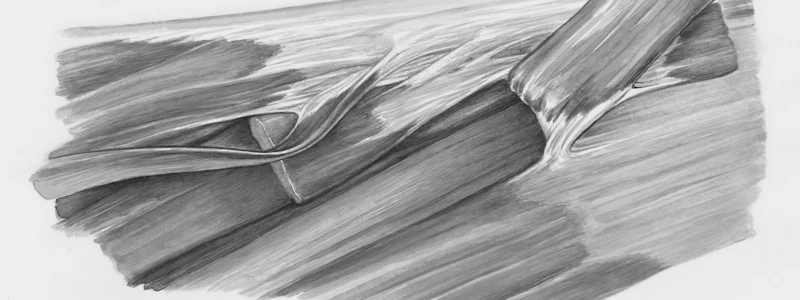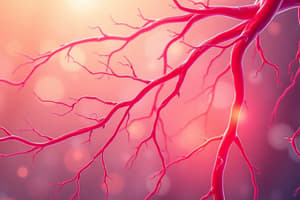Podcast
Questions and Answers
What role does the endothelium of simple squamous epithelium play in the vascular system?
What role does the endothelium of simple squamous epithelium play in the vascular system?
- It mediates the bidirectional exchange of molecules. (correct)
- It provides a thick barrier to prevent molecular exchange.
- It aids in the regulation of blood viscosity.
- It serves primarily as a structural support system.
Which layer contains smooth muscle in larger blood vessels?
Which layer contains smooth muscle in larger blood vessels?
- Tunica intima
- Tunica media (correct)
- Subendothelial layer
- Tunica adventitia
What is the primary function of the internal elastic lamina?
What is the primary function of the internal elastic lamina?
- To connect the tunica media to the tunica adventitia.
- To provide structural integrity by delimiting the vessel layers. (correct)
- To promote inflammation within the vascular wall.
- To facilitate clot formation in damaged vessels.
Which factor is primarily secreted to induce relaxation of smooth muscle in blood vessels?
Which factor is primarily secreted to induce relaxation of smooth muscle in blood vessels?
What defines the boundary between the tunica media and the tunica adventitia?
What defines the boundary between the tunica media and the tunica adventitia?
What is the primary role of smooth muscle cells in arterioles and small arteries?
What is the primary role of smooth muscle cells in arterioles and small arteries?
What component provides the resiliency for vascular wall expansion in large arteries?
What component provides the resiliency for vascular wall expansion in large arteries?
Which layer of blood vessel walls is innermost and consists of endothelial cells?
Which layer of blood vessel walls is innermost and consists of endothelial cells?
What term is used to describe the vessels that supply blood to the larger blood vessels themselves?
What term is used to describe the vessels that supply blood to the larger blood vessels themselves?
In which layer are collagen fibers primarily found in larger blood vessels?
In which layer are collagen fibers primarily found in larger blood vessels?
Which type of nerve fibers is associated with the vasomotor nerves that control vascular tone?
Which type of nerve fibers is associated with the vasomotor nerves that control vascular tone?
What is the main characteristic of the tunica media in larger blood vessels?
What is the main characteristic of the tunica media in larger blood vessels?
Which physiological process is primarily influenced by the gap junctions in smooth muscle cells of arterioles?
Which physiological process is primarily influenced by the gap junctions in smooth muscle cells of arterioles?
What is the primary function of muscular arteries?
What is the primary function of muscular arteries?
What distinguishes arterioles from larger arteries?
What distinguishes arterioles from larger arteries?
During systole, what physiological change occurs in elastic arteries?
During systole, what physiological change occurs in elastic arteries?
Which of the following best describes the composition of the walls of muscular arteries?
Which of the following best describes the composition of the walls of muscular arteries?
What is the role of arterioles in the circulatory system?
What is the role of arterioles in the circulatory system?
What effect does smooth muscle contraction have on blood flow?
What effect does smooth muscle contraction have on blood flow?
Which type of artery is primarily responsible for maintaining steady blood pressure?
Which type of artery is primarily responsible for maintaining steady blood pressure?
Which arteries serve as examples of muscular arteries?
Which arteries serve as examples of muscular arteries?
What initiates the process of atherosclerosis in small to medium arteries?
What initiates the process of atherosclerosis in small to medium arteries?
What is the primary structural component of a fibro-fatty plaque in atherosclerosis?
What is the primary structural component of a fibro-fatty plaque in atherosclerosis?
What primarily causes peripheral resistance in blood flow?
What primarily causes peripheral resistance in blood flow?
Which of the following layers is NOT a part of muscular arteries?
Which of the following layers is NOT a part of muscular arteries?
Which structural feature of the microvascular bed allows for blood flow regulation?
Which structural feature of the microvascular bed allows for blood flow regulation?
How does hypertension commonly manifest in relation to the cardiovascular system?
How does hypertension commonly manifest in relation to the cardiovascular system?
What occurs to the tunica media as the diameter of a muscular artery decreases?
What occurs to the tunica media as the diameter of a muscular artery decreases?
What characterizes the internal elastic lamina's appearance during blood vessel contraction?
What characterizes the internal elastic lamina's appearance during blood vessel contraction?
Which feature is associated with early stages of atherosclerosis?
Which feature is associated with early stages of atherosclerosis?
What is the primary composition of the adventitia (TA) in blood vessels?
What is the primary composition of the adventitia (TA) in blood vessels?
What consequence can result from atherosclerosis in muscular arteries?
What consequence can result from atherosclerosis in muscular arteries?
What distinguishes muscular arteries from elastic arteries?
What distinguishes muscular arteries from elastic arteries?
Which vessels are the smallest branches from the metarteriole?
Which vessels are the smallest branches from the metarteriole?
The presence of the external elastic lamina is typically found in which type of artery?
The presence of the external elastic lamina is typically found in which type of artery?
What is a function of the metarterioles in the microvascular bed?
What is a function of the metarterioles in the microvascular bed?
Which type of cells may be present in true capillaries, although they do not contain smooth muscle cells?
Which type of cells may be present in true capillaries, although they do not contain smooth muscle cells?
Flashcards are hidden until you start studying
Study Notes
Types of Arteries
- Aorta, pulmonary, common carotid, subclavian, and common iliac arteries are categorized as elastic arteries.
- Muscular arteries function as distributing arteries and are 10-1 mm in diameter.
Muscular Arteries
- Composed mainly of collagen fibers, blood vessels, and nerve fibers, with smooth muscle for contraction and relaxation.
- Regulate blood flow to organs through vasodilation (widening) and vasoconstriction (narrowing).
- Examples include femoral and brachial arteries, responsible for steady blood pressure and flow.
Arterioles
- Diameter is 100 mm or less and are small-resistance vessels.
- Contain one or two layers of circularly arranged smooth muscle cells.
- Major regulators of systemic blood pressure, controlling blood flow to capillaries.
Elastic/Large Arteries
- Primarily transport blood to smaller arteries.
- During ventricular contraction (systole), elastic walls distend to accommodate forceful blood movement due to the stretching of elastin.
- Lumen lined with simple squamous epithelium, allowing efficient exchange of molecules.
Tunica Layers of Blood Vessels
- Larger blood vessels consist of three concentric layers (tunics): tunica intima, tunica media, and tunica adventitia.
Tunica Intima
- Composed of endothelium and subendothelial loose connective tissue.
- Contains a thin internal elastic lamina, important for vessel structure.
Tunica Media
- Thick layer, containing up to 40 layers of smooth muscle cells and varying elastic lamellae.
- Thickness of the tunica media decreases with smaller vessel diameter.
Tunica Adventitia
- Composed of loose to moderately dense connective tissue; may contain smooth muscle cells.
- Hosts vasa vasorum, which nourishes vessel walls too thick for diffusion.
Smooth Muscle Fibers
- Present in all vessels larger than capillaries; arranged in a helical fashion.
- Smooth muscle cells interconnected by gap junctions enable vasoconstriction and vasodilation.
Vasa Vasorum
- Known as "vessels of the vessel," supplying blood to larger vessels' outer layers.
- Present in the tunica adventitia and outer tunica media of larger arteries and veins.
Atherosclerosis
- A significant disease affecting elastic and large muscular arteries, contributing to many deaths in developed regions.
- Initiated by endothelial cell damage leading to LDL oxidation, monocyte and macrophage adhesion.
- Fatty streaks develop into atheromas consisting of smooth muscle cells, collagen, and necrotic material.
- Can cause arterial bulges (aneurysms) and occlude muscular arteries like the coronary arteries.
Microvascular Bed Structure
- Arterioles supplying capillary beds branch into metarterioles with smooth muscle bands acting as precapillary sphincters.
- Thoroughfare channels, distal to metarterioles, lack smooth muscle and connect with post-capillary venules.
- True capillaries, the smallest vessels, branch from metarterioles and thoroughfare channels, facilitating nutrient exchange.
Studying That Suits You
Use AI to generate personalized quizzes and flashcards to suit your learning preferences.




